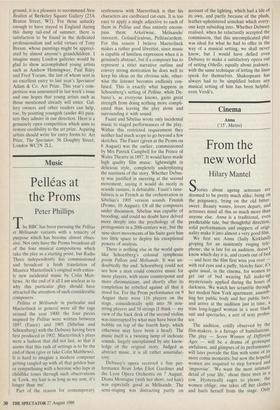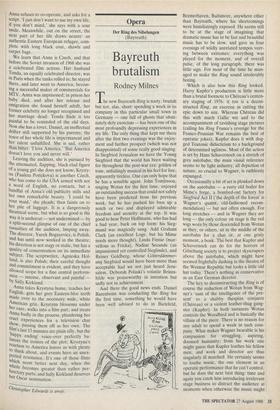Cinema
Anna ('15', Metro)
From the new world
Hilary Mantel
Stories about ageing actresses are doomed to be pretty much alike: bring on the poignancy, bring on the old bitter- sweet. Beauty wanes, lovers depart, and actresses mind all this so much more than anyone else. Anna is a traditional, even predictable tale, but thoughtful direction, solid performances and snippets of origi- nality make it into almost a very good film. We first see Anna (Sally Kirkland) groping for an insistently ringing tele- phone; she is late for an audition, doesn't know which day it is, and crawls out of bed — and here the film first wins you over— with red eyes and a puffy, blotchy face; it's quite usual, in the cinema, for women to get out of bed wearing full make-up mysteriously applied during the hours Of darkness. We watch her scramble through her modest New York apartment, assemb- ling her public body and her public face, and arrive at the audition just in time, a trim long-legged woman in a neat black suit and spectacles, a sort of sexy profes- sor.
The audition, coldly observed by the film-makers, is a farrago of humiliations. The play — Seven Women of Different Ages — will be a drama of grotesque awfulness, and glimpses of its performance will later provide the film with some of its more comic moments; but now the hopeful women are required to step forward and 'improvise'. 'We want the most intimate detail of your life,' shout three men in a row. Hysterically eager to please, the women oblige; one takes off her clothes and hurls herself from the stage. Only Anna refuses to co-operate, and asks for a script. 'I just don't want to use my own life, if you don't mind,' she says with a sour smile. Meanwhile, out on the street, the next part of her life draws nearer: an authentic Eastern European refugee, com- plete with long black coat, shawls and carpet bags.
We learn that Anna is Czech, and that before the Soviet invasion of 1968 she was a celebrated film actress. Her husband Tonda, an equally celebrated director, was in Paris when the tanks rolled in; he stayed there, and later went to America, becom- ing a successful maker of commercials for MTV. Anna was imprisoned; in prison her baby died, and after her release and emigration she found herself adrift, her former celebrity no longer recognised and her marriage dead: Tonda finds it too painful to be reminded of the old days. Now she has a lover, Daniel, an ineffectual drifter still supported by his parents; the tenor of her whole life is impermanent and her talent unfulfilled. She is sad, rather than bitter: 'I love America.' But America doesn't love you and never will.' Leaving the audition, she is pursued by the attenuated, flapping, black-clad figure of a young girl she does not know; Krysty- na (Paulina Porizkova) is another Czech, who has come to the USA armed with not a word of English, no contacts, but a handful of Anna's old publicity stills and her own remarkable beauty. 'I could be Your maid,' she pleads; then faints on to her pile of luggage. It is a dangerously theatrical scene, but what is so good is the way it is undercut — not undermined — by a split-second glimpse of one of the chief casualties of the audition, limping away. The director, Yurek Bogayevicz, is Polish, and has until now worked in the theatre; his direction is not stagy or static, but has a quality of concentration on its immediate subject. The scriptwriter, Agnieska Hol- land, is also Polish; their careful thought and commitment is evident, and they have allowed scope for a fine central perform- ance — intense, observant and painful — by Sally Kirkland.
Anna takes Krystyna home, teaches her English, gets her grey Eastern-bloc teeth made over to the necessary wide, white American grin. Krystyna blossoms under her care, walks into a film part, and treats Anna badly in the process, plundering her cruel experiences for a television chat show, passing them off as her own. The film's last 15 minutes are plain silly, but the 'happy ending' voice-over perfectly ba- lances the ironies of the plot; Krystyna's reaction to America leaves us with plenty to think about, and events have an unex- pected resonance. It's one of those films Which seem better next day, when the Whole becomes greater than rather per- functory parts; and Sally Kirkland deserves her Oscar nomination.
Christopher Edwards is away.















































 Previous page
Previous page